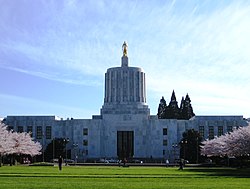The 63rd Oregon Legislative Assembly was the legislative session of the Oregon Legislative Assembly that convened on January 14, 1985, and adjourned June 21 the same year. [1] [2]
Contents
| 63rd Oregon Legislative Assembly | |||||
|---|---|---|---|---|---|
| |||||
 The legislature took place in the Oregon State Capitol, seen here in 2007 | |||||
| Overview | |||||
| Legislative body | Oregon Legislative Assembly | ||||
| Jurisdiction | Oregon, United States | ||||
| Meeting place | Oregon State Capitol | ||||
| Term | 1985 | ||||
| Website | www.oregonlegislature.gov | ||||
| Oregon State Senate | |||||
| Members | 30 Senators | ||||
| Senate President | John Kitzhaber (D) | ||||
| Majority Leader | Steve Starkovich (D) | ||||
| Minority Leader | Tony Meeker (R) | ||||
| Party control | Democratic Party of Oregon | ||||
| Oregon House of Representatives | |||||
| Members | 60 Representatives | ||||
| Speaker of the House | Vera Katz (D) | ||||
| Majority Leader | Shirley Gold (D) | ||||
| Minority Leader | Larry Campbell (R) | ||||
| Party control | Democratic Party of Oregon | ||||